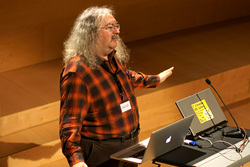Historical Development
Connectivism as a learning theory is a very recent development. In 2005, both George Siemens and Stephen Downes published articles explaining their takes on Connectivism and learning. George Siemens' article, Connectivism: A Learning Theory for the Digital Age , was published online in 2004 and in the International Journal of Instructional Technology and Distance Learning in 2005. Stephen Downes' article, An Introduction to Connective Knowledge , was published online in 2005 and in Media, Knowledge & Education - Exploring new Spaces, Relations, and Dynamics in Digital Media Ecologies in 2007. Since then, both Siemens and Downes have both written and spoken widely on the subject and have differing viewpoints. Siemens tends to focus on the social aspects of Connectivism and often discusses social networks and web 2.0 tools, while Downes tends to focus more on neural networks and his discussion of Connectivism echoes ideas from Neural Networks which are often applied to education in the form of Brain-Based Learning.
Connectivism as a learning theory is not without controversy. Critics, such as Bill Kerr assert that Connectivism may not even be a learning theory.
Connectivism as a learning theory is not without controversy. Critics, such as Bill Kerr assert that Connectivism may not even be a learning theory.

George Siemens
Siemens is with the Technology Enhanced Knowledge Research Institute at Athabasca University, a leading online Canadian university.
His Blog: connectivism
His Blog: elearnspace
Siemens is with the Technology Enhanced Knowledge Research Institute at Athabasca University, a leading online Canadian university.
His Blog: connectivism
His Blog: elearnspace

Stephen Downes
A video of Stephen Downes introducing himself
His Website
His Blog: Half and Hour
His Book: Connectivism and Connective Knowledge: Essays on meaning and learning networks
A video of Stephen Downes introducing himself
His Website
His Blog: Half and Hour
His Book: Connectivism and Connective Knowledge: Essays on meaning and learning networks
